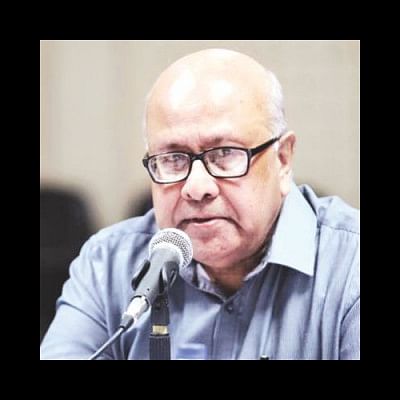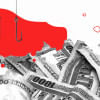Loan default increases because of bad management

The new finance minister, Mustafa Kamal, has vowed to address the longstanding concerns regarding increasing non-performing loans in banks. Khondkar Ibrahim Khaled, a noted banker and former deputy governor of Bangladesh Bank, talks to The Daily Star's Nazmul Ahasan about the issue.
The newly appointed finance minister has promised that non-performing loans (NPL) will not increase by "a penny" from now on. Better even, he vowed to reduce the NPL ratio. How much confidence, if any, do you have in his assurance?
Whether a minister's tough words will suffice to fend off the increase of bad loans is yet to be tested. But we cannot take his assurance at face value.
It is because of bad management or lack of proper management that loan default increases. Those who are responsible for sanctioning loans—that is to say, bank officials—aren't being able to exercise their discretion or take a decision based on their experience. Yes, at times, the officers themselves may have failed to apply proper discretion while taking a decision to sanction a loan. But mostly, when it comes to disbursing a large loan, certain powerful quarters severely influence them. If this practice continues unabated, the minister's promise will not materialise. There have to be serious will and effort by bank owners and the political leadership to impede the malpractice. Only then will his optimism be reflected in reality.
Speaking of owners, aren't they liable for the current mess to some extent? It's a well-known fact in our banking sector that bank owners or directors act in connivance with each other to take loan from other banks. Should it be permissible?
In Bangladesh, it is generally businessmen and industrialists who own banks as shareholders or directors. It is only normal that they, too, may need loans. True, as per the central bank's regulation, they cannot take loans from their own banks. But there are no other rules that restrict them from taking loans from other banks.
However, as you mentioned, "swapping" does take place: I'm giving you loans from my bank, so in return, you'll also sanction loans for me. Under an unwritten understanding, they are unethically colluding with each other.
The collective amount of loans taken by bank directors stands at approximately Tk 900 billion, as far as I can remember. Even when they do not make the scheduled payment for the prescribed period, their loans are rescheduled or regularised through shady means.
You once compared the NPL ratio exceeding 10 percent with the disaster signal number 10. The finance minister, however, accused the media of exaggerating the crisis. He argued that the current NPL ratio—now around 11-12 percent—is nothing extraordinary compared to other countries in the world and that it's still "manageable". How do you view such a notion?
What the minister said is tantamount to sweeping the crisis under the carpet. I do not agree with the view. In Europe, if the NPL ratio reaches two percent of the disbursed loan, they get worried. In our context, however, given the culture of bad management, I believe the manageable ratio should be below five percent.
Even worse, the current figure, while statistically accurate, also doesn't paint how bad the situation is. It doesn't indentify the real culprits—that is to say, some state-owned banks where bad loans amount to 30 percent of the entire disbursed loan. By averaging the NPL ratios of all banks, the crisis in the state-owned banks is intentionally underestimated.
One of the reasons you cited for the condition of some state-owned banks is that the central bank doesn't have any regulatory power over these banks. But unlike other countries like India—where the governor of the central bank recently resigned in protest of the government's attempt to interfere in its affairs—our government enjoys much sway over the central bank. Would handing over the power to regulate state-owned banks to the central bank be really helpful?
In India, the central government has always tried to uphold the independence of the central bank since the country's independence. The law prohibits the government to interfere with the central bank's policies, except for "public interest". The central government has not invoked the exception clause until recently when the Modi government pressurised the bank to release reserves to it. When the governor resigned in protest, the government backed off from pursuing it any further and came to a compromise deal.
On the other hand, our former finance minister, Abul Maal Abdul Muhith, had summoned the central bank governor, and arranged a meeting with the owners of private banks—an act perhaps unprecedented in modern banking history. It was a clear case of conflict of interest.
I can cite my own experience as the deputy governor when Mohammed Farashuddin was the governor. In 1996, when Awami League came to power, the party's Chattogram unit chief was also the chairman of UCB bank. When we found out several irregularities in the bank, we silently removed the entire board including him, without having consulted with the government.
Expectedly, the decision created many hues and cries. Shah AMS Kibria, the then finance minister, privately supported our move but maintained that the decision was politically damaging for the government. Politics was not our concern; we shot back, and he did appreciate us.
So, the political leadership has to respect the integrity and independence of the central bank?
That is a given. In addition, those responsible for regulating the financial sector should not only have banking knowledge but also the guts to speak truth to power. If Bangladesh Bank could take a hard stance against the bank during our time, why did the governor fail to decline the finance minister's invitation to attend the meeting with bank owners? So, it also depends on those at the helm.
The government has given tens of billions of taka to salvage ailing banks. It argues that it cannot let a bank fail because it will seriously erode the public's trust in the financial sector. But even then, is bailing out badly managed banks with taxpayers' money justifiable?
From a legal perspective, there's nothing wrong about bailing out banks. But it's a very highly unethical act. Our banks are relatively small.
India's largest lender is a state-owned bank, State Bank of India. The bank has never taken a penny as capital infusion from the government. Rather, it generates billions of dollars as revenue every year. The government's finance department never interferes with matters involving these banks. Moreover, unlike us, you'll not find any joint secretaries in the board of these banks. They employ only experienced and skilled bankers in the board.
If Indian state-owned banks can generate profits, why do ours fail so terribly? If private banks in Bangladesh are profitable, why are Sonali Bank or Janata Bank among the loss-making banks? It is because money is plundered in collusion with unscrupulous individuals in the government.
Lastly, you have criticised how Bangladesh handled the 81-million-dollar heist. Bangladesh withheld a report, while the Philippines have already indicted a person over the matter. But some argue that withholding investigation reports is a strategic decision since it may have legal ramifications. Does such a view hold water?
Yes, there may be some negative consequences. Mohammed Farashuddin led the investigation, and what is said to have been recommended in the report, it seems to me, was the outcome of a purely administrative mindset. It is said to have pinpointed to a group of individuals who allegedly committed the crime. But I can say with absolute guarantee that it was not the case.
The Federal Bureau of Investigation (FBI) in the US also investigated the matter. It blamed Park Jin Hyok, a North Korean national and a sophisticated hacker, for the heist. It was investigating cyber crimes targeting US institutions and companies and concluded that Hyok was also responsible for the Bangladesh Bank heist. The FBI also mentioned some Chinese individuals as his accomplices but found no involvement of any Bangladeshi.
If the report actually says that Bangladeshis carried out the act, I wholeheartedly would disagree with the finding. In that case, I would say there was a justification for the report being suppressed because it would have handed the Philippines' attorneys a legal weapon. But I do question why a case is yet to be filed even after such a decision was taken two years ago.










Comments